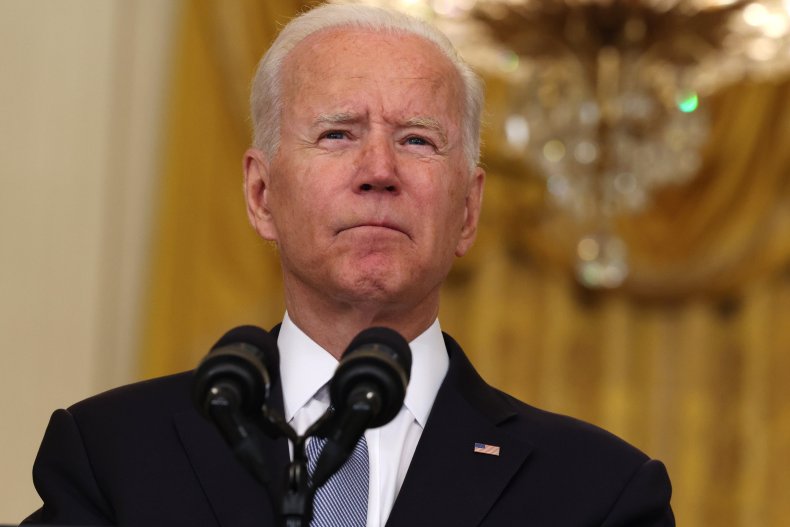Is Biden's Summit for Democracy a Good Idea? | Opinion
This December, the United States and like-minded nations around the world will attend a two-day event the Biden administration has labeled the Summit for Democracy. While the guest list is a work in progress, the White House has emphasized that the summit will be a high-profile opportunity to rally fellow democracies, take stock of the health of democratic governance globally and coordinate strategies to ensure democracies are delivering.
The summit reflects an urgency from the administration at large about fears of an autocratic resurgence. In speeches and public remarks, President Joe Biden continues to stress the theme of a democratic coalition that is increasingly pressured by the likes of Russia's Vladimir Putin and China's Xi Jinping. Strengthening democratic values and pushing back against authoritarianism was the foundational premise of Biden's first trip to Europe last June. "I predict to you, your children or grandchildren are going to be doing their doctoral thesis on the issue of who succeeded: autocracy or democracy," Biden said in March.
Organizing a club of democracies to get everyone on the same page would at first blush seem like a logical step in pursuit of bolstering the prospects of democracy—writing the rules for the future of the world order in the 21st century. However, in the process of planning for a big, flashy summit, nobody is bothering to ask the fundamental question: Is it in the U.S. national security interest to manufacture a battle between democracies and autocracies in the first place?
The answer is no. At best, pitting democracies against autocracies is a highly simplistic response for an ever more complex world. At worst, it's a recipe for permanent confrontation down the road.
First, getting democracies on the same page is not an easy, smooth, or straightforward process. The practicalities of establishing a democratic club with the U.S. at the top of the heap are highly complicated and is likely to engender resentment from the very allies Washington hopes to shore up.
For one, democracies aren't homogeneous; not every democracy views the world the same way or has the same strategic calculations as Washington does. Some, like Germany, are quite skeptical about U.S. foreign policy with respect to China and have a good reason to want to maintain positive relations with Beijing, a one-party state that also happens to be the world's biggest economic power. Others, like France, remain wary of diverting NATO's gaze from Europe to Asia in order to counterbalance China, which Washington pushed for during the alliance's annual meeting this summer. Just like the U.S., Europe has its own interests to protect, most prominently a $687 billion trading relationship with China (not including services) that would likely face negative ramifications in the event the European Union favored Washington's more confrontational stance.

Other close U.S. allies, particularly Japan and South Korea, have a tricky balancing act to maintain between the U.S. and China and will be highly risk-adverse to picking sides in a hypothetical democracy versus autocracy clash. While Tokyo's stance toward Beijing is leaning in a more confrontational direction on account of China's more aggressive presence missions over Taiwan and the East China Sea, the Japanese government understands that allowing the U.S. to dictate Japan's China policy would be disastrous. After all, China is Japan's leading export market, having accounted for more than 20 percent of Japanese exports last year. The same considerations can be said with U.S. ally South Korea, which as a much smaller neighbor to China, has first-hand experience with Beijing's economic retaliation. Seoul may be troubled by some of China's positions, but it's unlikely to blindly follow Washington's lead.
In short, just because countries share similar governing philosophies and values doesn't mean their interests are identical. The U.S. would be making a big mistake if it forced its preferences upon others or browbeat other democracies into participating in an ideological struggle against authoritarianism.
If ideology was the main driving force in geopolitics, basing U.S. foreign policy on ideological competition would make some degree of sense. Unfortunately, the world isn't so clean or dogmatic. Interests, not values, guide state behavior in the international system. When those interests align, states often have an incentive to cooperate with each other. In many cases, solving or managing international problems requires the U.S. and other democracies to work with countries that may rig free elections, quash political dissent, jail (or worse) anti-government critics and restrict civil society. Reducing the world's nuclear weapons stockpiles, for example, is impossible without Russia's buy-in. The U.S. won't be able to deal with North Korea effectively if China isn't at least read into the process. Striking a nuclear agreement with Iran won't happen unless Iran itself agrees to participate.
In sum, the U.S. has no choice but to branch out from their fellow liberal democracies if it wants to get things done. Launching a values-based crusade against them, however emotionally satisfying it may be, undermines the pragmatism that is often the key between success and failure in international relations.
The U.S.-organized Summit for Democracy is meant to give democracies a boost and put autocracies on notice. But the summit carries the risk of being counterintuitive—widening disagreements between countries with different systems of government, injecting unneeded emotionalism into the debate and solidifying a Russia-China strategic relationship that could alter the balance of power to Washington's disadvantage.
Daniel R. DePetris is a fellow at Defense Priorities and a foreign affairs columnist at Newsweek.
The views expressed in this article are the writer's own.


